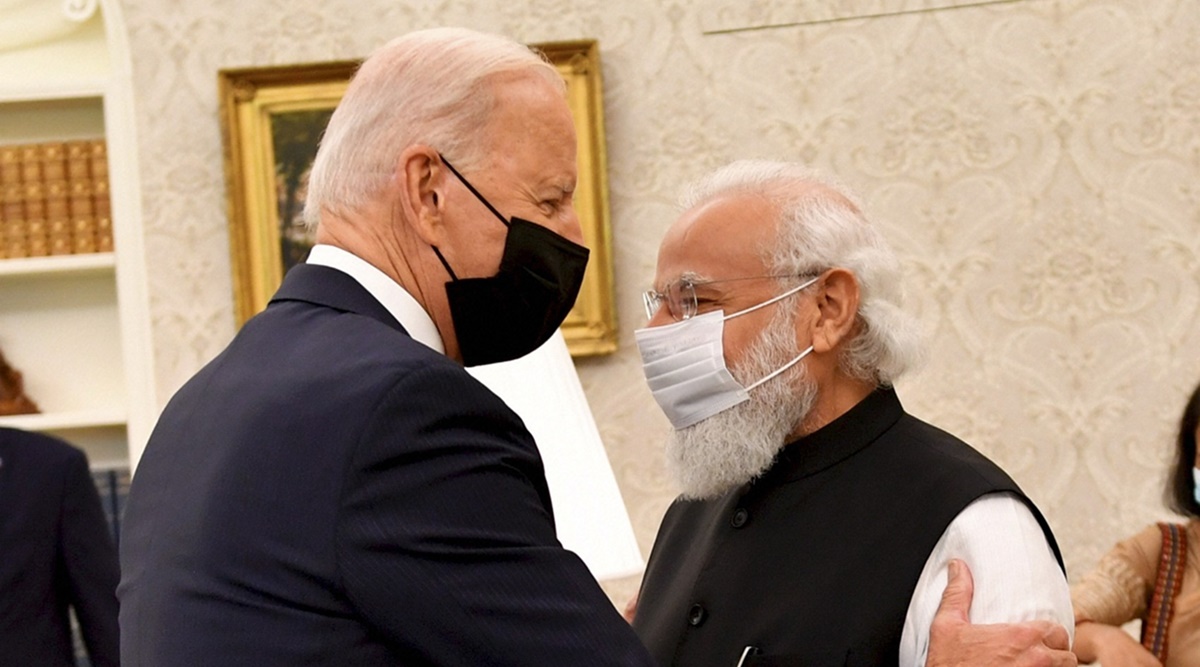Updated: February 22, 2022 4:57:37 am
 Washington: Prime Minister Narendra Modi with US President Joe Biden in the Oval Office of the White House, Friday, Sept. 24, 2021, in Washington. (PTI Photo)
Washington: Prime Minister Narendra Modi with US President Joe Biden in the Oval Office of the White House, Friday, Sept. 24, 2021, in Washington. (PTI Photo) Written by Atul Keshap
Democracy is under strain. We see social tensions within open societies intensify as citizens question whether their system can deliver for them during this pandemic. Our competitors sense discord and the opportunity to challenge the relevance of democratic nations on the world stage. The prospect of global conflict is rising, and strategic competition is heating up; the free world feels beset.
I am, however, an optimist. Throughout my 28-year career as an American diplomat, including my time serving as Chargé d’Affaires to India, I have engaged with governments, citizens, and civil society to pursue shared interests and advance a positive vision of a freer and safer world predicated on fundamental human rights. For these efforts to succeed, we must demonstrate to our people and the world that democracy can secure their well-being and dignity, create a fair and innovative marketplace, and deliver economic growth and good jobs.
We find ourselves at a critical moment of geostrategic and geoeconomic convergence that demands the US and India embrace closer economic cooperation. I believe our two democracies can demonstrate to the world that we can, proverbially, deliver the goods for our people.
Through the pandemic, the US and India have shown the remarkable things we can accomplish when we work together. Delhi and Washington came to each other’s assistance at moments of crisis, and we cooperated to airlift hundreds of millions of free doses of vaccines to low-income countries — generosity that reflects the values and compassion of our people.
This pandemic recovery, however, presents new trials. Inflation and supply chain woes are shrinking consumers’ buying power, leading them to question the direction of our economic policies. Americans are seeing a dire workforce shortage, shipping delays, and in some cases, empty store shelves. At the same time, Indians are seeing the prices of essential commodities like fuel, cooking oil, and produce skyrocket. Some of this is temporary, as the Omicron wave results in many sick workers in crucial fields. Other root causes, however, are structural and require our urgent attention.
To prove that democracies can lead in the post-pandemic world, the US and India must work together to increase supply, bring prices down, and improve economic confidence. Delhi and Washington need to work together to remove unnecessary barriers to trade and seize the vast opportunities of our commercial relationship — aspiring to achieve $500 billion in bilateral trade in goods and services. As strategically aligned partners facing shared challenges, the US and India can work to make the free world’s supply chains more robust and resilient through closer cooperation across a range of sectors — including defence, energy, healthcare, and agriculture.
This cooperative approach could lead to widespread and impactful benefits for our citizens. We could see lifesaving medical innovations reach patients faster and at a better price point by protecting innovation and avoiding unnecessary regulatory divergence. We could better secure our borders through a stronger defence partnership and accelerate the energy transition. In the immediate future, we could ensure more affordable and reliable access to the goods our people need every day, stretching paycheques for our 1.7 billion consumers and citizens.
With a reinvigorated Quad and a reopened Trade Policy Forum, we have the government channels to pursue these goals. Now is the time for both governments to begin the hard work of removing the stumbling stones in the commercial relationship and prepare the way for a bilateral trade agreement. That road will be long, and some will call the goal unrealistic. As a diplomat, I heard the doubters make the same arguments before we sealed the India-US Civil Nuclear Agreement. It was a seemingly impossible undertaking, with a thousand nay-sayers and unworkable obstacles, until leaders on both sides decided it must be done to serve the security interests of both countries. A bipartisan majority in each country ensured the passage of that agreement, which supported India’s rise in global affairs and facilitated strategic convergence between Delhi and Washington. Our leaders can likewise embrace the goal of a bilateral trade agreement as a powerful tool to deliver greater prosperity and opportunity that improves citizens’ lives and proves the case for democracy around the world.
As we encounter an increasingly competitive and risky geopolitical arena in the 21st century, the US and India can spearhead a sustainable and inclusive abundance agenda through our trade partnership, making the case for democracy through our shared prosperity. This includes relaxing India’s trade barriers, lowering America’s talent barriers, ensuring sound and aligned regulatory practices, securing the free world’s supply chain, and promoting investment across the corridor. As we face the challenges to democracy together, our prosperity is our strength, and our commercial relations are essential to enduring and meaningful cooperation.
The remarkable history of our nations demonstrates that democracies can secure the liberty, safety, and dignity of their people. Combined with free enterprise, these commitments can build a more prosperous and exciting future for the world. Our politicians, bureaucrats, and companies must work together to prove that democracies continue to deliver and show that the free people of America and India can lead the 21st-century world to even greater opportunities for the pursuit of happiness.
The writer is a former US Chargé d’Affaires to India and is currently president, US-India Business Council.
- The Indian Express website has been rated GREEN for its credibility and trustworthiness by Newsguard, a global service that rates news sources for their journalistic standards.

